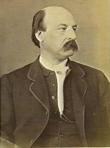English-born composer, music director.
G. B. Allen, Mus. Bac., Oxon., commenced his musical career at the age of eight, when he received six pounds per annum as a chorister at St Martin-in-the-Fields, Trafalgar Square. Two years later, he was accepted by Westminster Abbey, and later moved on to Chapel Royal, Whitehall. When his voice broke, Allen entered the choir at St. Paul's Cathedral as a basso, and at age 20 accepted a vicar-chorals berth in Armagh Cathedral, Ireland, where he remained for some ten years. Among his achievements during that period was his role in establishing the first Belfast Choral Society capable of producing the works of Handel and other great masters. He also started the scheme that allowed Ulster Hall to be remodelled, thus providing more space for audiences to hear these works. Allen returned to London in his late twenties to take up a post as organist. It was shortly afterwards, in 1865, that his two-act comic opera Castle Grim (libretto by R. Reece) was staged at London's New Royalty Theatre (Times 4 September 1865, p.10).
Some time around 1870-71, Allen travelled to Australia, and in 1872 collaborated with Grosvenor Bunster on The Belle of Woolloomooloo. The following year, he was engaged by Garnet Walch to arrange and write new material for his adaptation of Offenbach's Genevieve de Brabant, which was staged at Melbourne's Opera House (beginning 11 September) and Sydney's Royal Victoria Theatre (beginning 26 December). He conducted W.S. Lyster's Royal English Opera Company during its Melbourne season in 1875 (beginning 7 June). The repertoire included a production of Castle Grim (11 June). An Argus music critic wrote of Allen's score that 'the music has an air of old-fashioned respectability about it. The concerted pieces... are very English and very nice to listen to. All the solos are tuneful, and some of them of a superior kind' (12 June 1875, p.7). According to a 1895 Brisbane Courier article, one of the stars of the season was his student, Alice May. Her talent had previously caught the attention of Lyster, who pressed Allen to convince her to try opera. Her success in Australia subsequently led her to work in London (1 April 1895, p.4).
Although Allen's whereabouts over the next decade and a half have not been established, it appears likely that he returned to England for at least several years. His name is once again associated with Australia in the early 1890s, at which time he seems to have settled in Brisbane. One of his earliest known engagements in Brsibane was as music director for Emma Wanghenheim's comic opera season at Her Majesty's Theatre. The company opened on Boxing Day with Chassiagne's Falka. Two years later he collaborated with James Brunton-Stephens on the comic opera Fayette; Or, Bush Revels.
In 1894, Allen's dramatic song 'The Crimson Cloak' was reviewed by the Sydney Morning Herald as one of the best numbers in the new Violets Album (ctd. 15 December, 1894, p.5). Another of his popular songs from this period was 'Softly Fell the Sunshine', published by H. J. Sammuel (Sydney Morning Herald 1 May 1895, p.2). It was sung with great success in Australia by Alice Esty, and advertised as being taught by several leading Australian-based music teachers, including Miss Montague Turner and Mons T. Riccarul (Sydney Morning Herald 18 May 1895, p.2). In 1897, his song 'Bygone Days' was performed by Bessie Morgan at the Gaiety Theatre as part of a vaudeville programme being run under the management of Delohery, Bovis, and Deane (15 May). Other known songs include 'The Voice of Moonlight', 'Loving Voices,' 'I Love My Love in the Morning', 'T'was Long, Long Since in the Springtime,' and 'Three Plagues of Life' (Brisbane Courier 30 May 1895, p.1).


